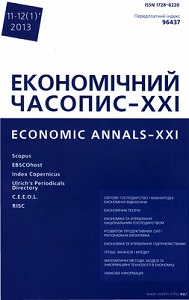МЕТОДОЛОГІЧНІ ПРОБЛЕМИ АНАЛІЗУ ВІДНОСИН СОЦІАЛЬНОГО ПОРЯДКУ В КАТЕГОРІЙНИХ СТРУКТУРАХ МІЖНАРОДНОЇ ПОЛІТИЧНОЇ ЕКОНОМІЇ
METHODOLOGICAL ISSUES OF SOCIAL ORDER RELATIONSHIPS ANALYSIS IN CATEGORIAL STRUCTURES OF INTERNATIONAL POLITICAL ECONOMY
Author(s): Nataliya DalevskaSubject(s): Economy
Published by: Institute of Society Transformation
Keywords: international political economy; actors of international relations; social order; legitimating; world political economic space
Summary/Abstract: The dynamism and dimensions of changes in the interaction of social and individual in a human being significantly complicate determination of global value guidelines in social order relations in structural categories of international political economy. This facilitates the study of cause-and-effect relations in the system of legitimation/delegitimizing of international power, power institutions of international, national and regional management, and the search of effective mechanisms of universal coordination of countries’ social policy in the context of social order relations reproduction within the universal political and economic space. The range of options to legitimize the social order relations depends on the implementation of economic, political and social transformations and formation of the national, regional and international security system of business entities. On the basis of the analysis of the social order’s methodological foundations two dominant approaches can be singled out: structural and cognitive ones. The main attention in the structural approach is concentrated on reorganization and organization of political institutes. The cognitive approach is characterized by the accent on reeducation, respecialization and resocialization of actors of the universal political and economic space. Both approaches don’t contradict each other, because they focus their attention upon complementary interaction of strategic goals of economic, political and social integration of international relations’ actors. Thus, the development of communication connections of international relations’ actors within the universal political and economic space can be considered to facilitate the evolution and transformation of international power institutes, cause drastic changes in structural categories of international political economy, regarding the formation of effective mechanisms to legitimize the social order relations by introducing the corresponding key factors, namely: normative and legislative factors, which may include the formation of universal standards of corporate culture and protection of intellectual property rights; economic factors – development of motivational tax system and stimulation of the world innovational infrastructure development; social and political factors – introduction of social partnership system and involvement of actors of international relations into realization of social programs, regarding the rational use of human development resources. At the same time, the social order relations within the universal political and economic space determine the structural basis of the international political economy, which fixes distinctive features of dynamic links to actors of international relations and actualizes problems of functional and normative specifics of institutional systems in the area of international relations. In this sense the interaction of actors of international relations in the power field of modern society more and
Journal: Економічний часопис - ХХІ
- Issue Year: 135/2013
- Issue No: 11+12 (1)
- Page Range: 12-15
- Page Count: 4
- Language: Ukrainian

